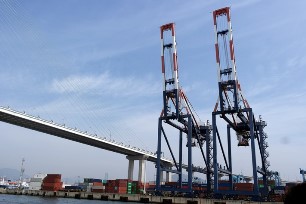 Development of efficient ports and optimizing maritime routes are key elements to harnessing opportunities from and facilitating international trade, enhancing connectivity and boosting economic growth in the Asia-Pacific region and beyond.
Development of efficient ports and optimizing maritime routes are key elements to harnessing opportunities from and facilitating international trade, enhancing connectivity and boosting economic growth in the Asia-Pacific region and beyond.
Following up from the inaugural seminar on 'Managing the Blue Economy' international project held in Papeete, French Polynesia, the second seminar focusing on ports and sustainability was held in Busan, Korea in partnership with the Korea Maritime Institute (KMI). The project is undertaken against the backdrop of a considerable shift in the shipping industry, which, after years of growth, is experiencing stagnant trade volumes, and in awareness of global environmental issues, accelerating efforts to enhance environmental-friendly productivity and beautification. The seminar addressed environmental challenges and risks such as climate change concerns and pollution at ports. It also looked at economic challenges in light of increasing size in vessels which necessitate upgrading or relocation of ports, pollution at ports and sea, best practices in increasing energy efficiency at ports and ships while keeping them green.
World seaborne trade has increased steadily to 9.8 billion tons in 2014 and currently there are more than 50,000 registered merchant vessels in operation. To cater to the growing volume and dependency on sea transport, vessel sizes have continued to increase dramatically over the last decade and as a consequence, there has been a cascade effect on the deployment of mega and large-sized vessels. With large vessels now operating at major sea routes, structural adjustments are demanded of ports, especially among the larger ones which must compete fiercely to become or remain regional hubs. However, increasing vessel size is no longer very economical post-2007; ships are already consuming minimum fuel with slow-steaming technology. Port upgrades have huge upfront cost implications and multiple considerations need to be factored into such decision-making process.
In respect to green initiatives and standards at ports, while they are important and have long-term benefits that go far beyond ports, if environmental criteria and rules become too stringent, ships would rather divert to more non-compliant and cheaper ports for short-term gains. Hence, shared commitment and action followed by sustainable business practices are essential, in order to prevent compromise of port standards for competitive reasons.
This project consisting of a series of three seminars in different PECC locations over 2015-2016 is led by the France (Pacific Territories) Committee for PECC (FPTPEC) and other member committees of PECC.
Program agenda and presentations for download
Executive summary

 Development of efficient ports and optimizing maritime routes are key elements to harnessing opportunities from and facilitating international trade, enhancing connectivity and boosting economic growth in the Asia-Pacific region and beyond.
Development of efficient ports and optimizing maritime routes are key elements to harnessing opportunities from and facilitating international trade, enhancing connectivity and boosting economic growth in the Asia-Pacific region and beyond.